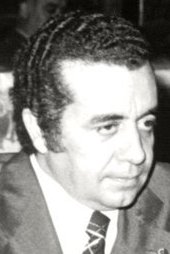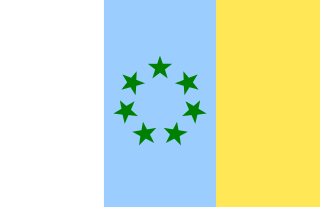
Yaiza is a municipality on the island of Lanzarote in the Canary Islands, Spain. It lies in the southwest of the island and forms part of the province of Las Palmas. The municipality is bounded by the Atlantic Ocean to the west, south and east. To the north, the Timanfaya National Park is partly within the municipality. The eastern part of the municipality is mountainous and, south west of the mountains, the Rubicon plain stretches to the coast.

Agüimes is a Spanish town and municipality in the eastern part of the island of Gran Canaria in the Las Palmas province in the Canary Islands.
Isleños are the descendants of Canarian settlers and immigrants to present-day Louisiana, Puerto Rico, Texas, Cuba, the Dominican Republic, Venezuela, and other parts of the Americas. In these places, the name isleño was applied to the Canary Islanders to distinguish them from Spanish mainlanders known as "peninsulars". Formerly used for the general category of people, it now refers to the specific cultural identity of Canary Islanders or their descendants throughout Latin America and in Louisiana, where they are still called isleños. Another name for Canary Islander in English is "Canarian." In Spanish, an alternative is canario or isleño canario.
Canarian cuisine refers to the typical dishes and ingredients in the cuisine of the Canary Islands, and it constitutes an important element in the culture of its inhabitants. Its main features are the freshness, variety, simplicity, and richness of its ingredients, the mix of seafood and meat dishes, its cultural influences and the low knowledge of it by the rest of the world. Canarian cuisine is influenced by other cultures, especially that of the aboriginal inhabitants of the islands (Guanches), and has influenced Latin American cuisine.

Eric Ragnor Sventenius was a Hispano-Swedish botanist.

Lorenzo Olarte Cullen was a Canarian politician and lawyer. He was president of the Canary Islands autonomous region but served only three years of his four-year term.

Canarian nationalism is a political movement that encourages the national consciousness of the Canarian people. The term includes several ideological trends, ranging from a demand for further autonomy within Spain to the right to self-determination.

Spanish Chileans refer more often to Chileans of post-independence Spanish immigrant descent, as they have retained a Spanish cultural identity. People of pre-independence Spanish descent are usually not considered Spanish Chileans even though they form a large majority of the Chilean population and have Spanish surnames and ancestry. This is because they rejected Spanish identity for the emergent Chilean one on the eve of national independence.

Paulino Rivero Baute is a Spanish politician and teacher. A member of the Canarian Coalition, he is the former president of the autonomous community of the Canary Islands.
Vicente Álvarez Travieso (1705–1779) was a Spanish judge and politician who served as the first alguacil of San Antonio, Texas, from 1731 until his death. He was a leading spokesperson of the Canary Islands settlers of San Antonio and was noted for his support for the Isleño community there. Through his demands to the leaders of New Spain, Travieso was able to improve the lives of the Isleños. He was instrumental in providing medical care for them, thus ensuring their survival. Travieso became mayor of San Antonio in 1776.

The Church of the Guanche People is a religious organisation, founded in 2001 in the city of San Cristóbal de La Laguna, Tenerife, Canary Islands, Spain. Its goal is to revive and spread the traditional religion of the indigenous Guanche people who occupied the islands at the time of Castillian conquest.

Spanish Costa Rican are people from Costa Rica with Spanish ancestry from both the conquerors of the colonial period as immigrants who arrived after independence and the Central American Federation of disunion. Historically this part of the population was called Criollo and were privileged but did not have equal rights with the Spaniards, some of them were mixed with Mestizos. Approximately 16,482 Spanish citizens living in Costa Rica for 2009.
Canarian Americans are Americans whose ancestors came from the Canary Islands, Spain. They can trace their ancestry to settlers and immigrants who have emigrated since the 16th century to the present-day United States. Most of them are descendants of settlers who immigrated to Spanish colonies in the South of the modern US during the 18th century. The Canarians were among the first settlers of the modern United States; the first Canarians migrated to modern Florida in 1569, and were followed by others coming to La Florida, Texas and Louisiana.

The Nationalist Canarian Initiative, initially called Canarian Initiative, was a nationalist political party in the Canary Islands founded in 1991.
Communist Party of the Canary Islands (provisional) (Spanish: Partido Comunista Canario-provisional, PCC(p)), later Party of the Canarian Revolution (Spanish: Partido de la Revolución Canaria), PRC) was a Marxist-Leninist and Canarian nationalist political party operating in the Canary Islands. The party aim was self-determination for the islands and socialism.
The Agreement of Nationalist Unity, frequently known under the name of its constituent parties, Canarian Coalition–Canarian Nationalist Party, was a permanent Canarian nationalist alliance formed by Canarian Coalition (CC) and Canarian Nationalist Party (PNC) in 2006 ahead of the 2007 Canarian regional election. The alliance has been renewed several times, in 2011, 2013 and 2018. For the 2011 and November 2019 general elections it was joined by New Canaries (NC). The alliance was dissolved in 2023, with the PNC arguing that the CC had now « nothing of nationalist »

El Museo Canario is an archeological museum in Las Palmas, the capital city of Gran Canaria in the Canary Islands. It is dedicated to the pre-colonial history of the Canary Islands.
Secundino Delgado Rodríguez was a Canarian politician, considered by some to be the father of Canarian nationalism.









